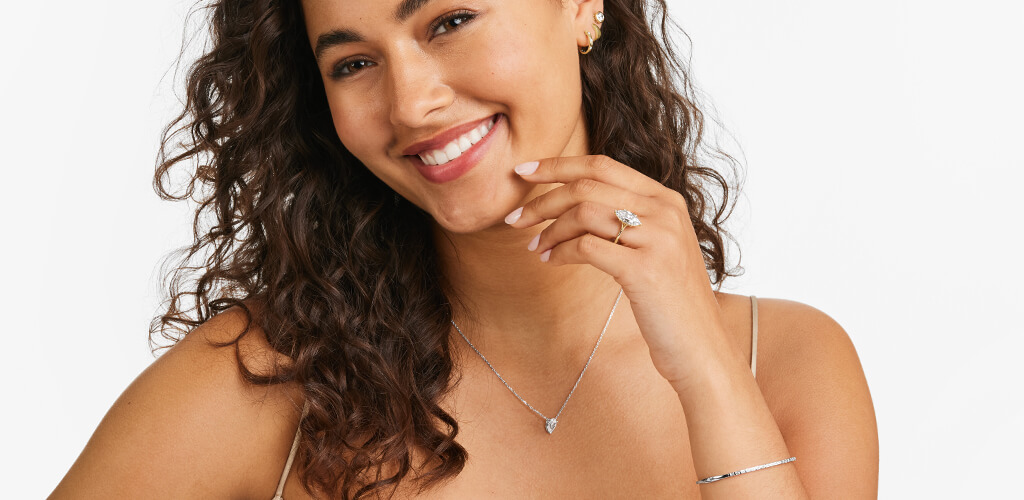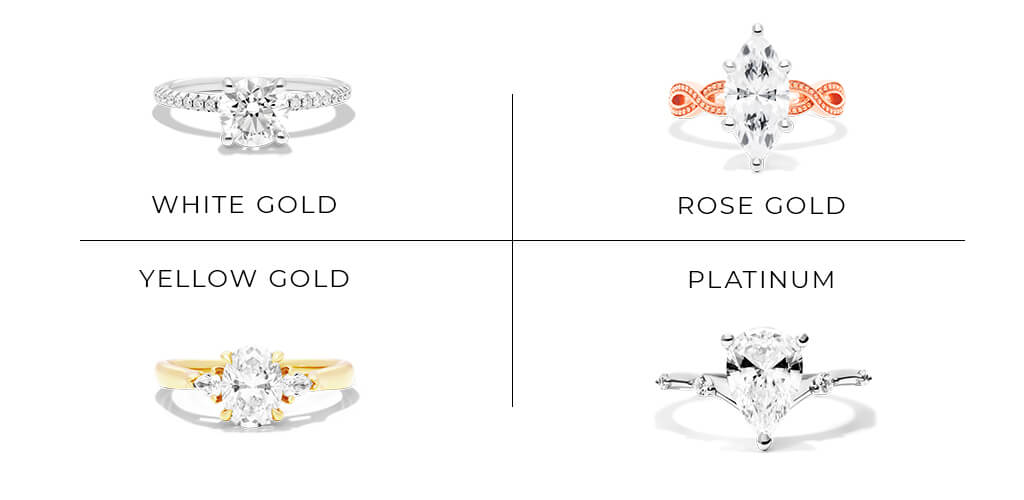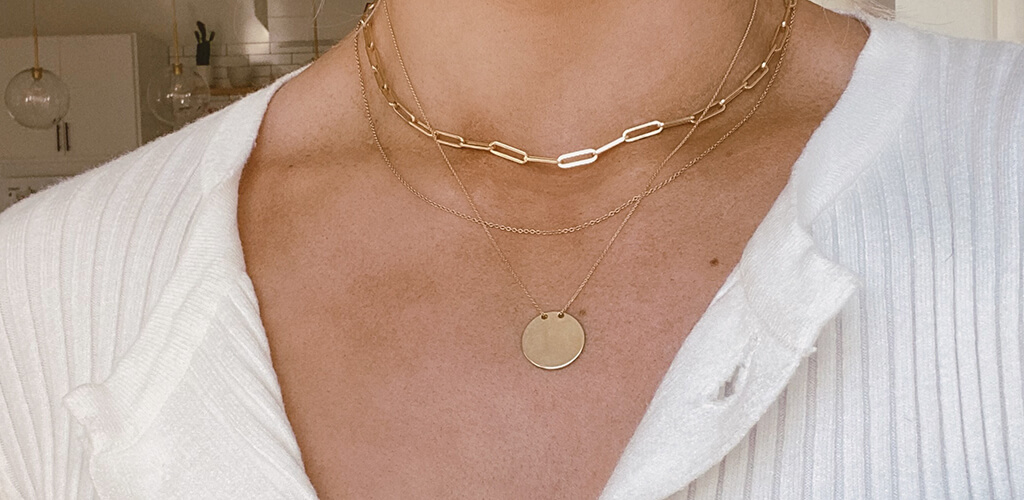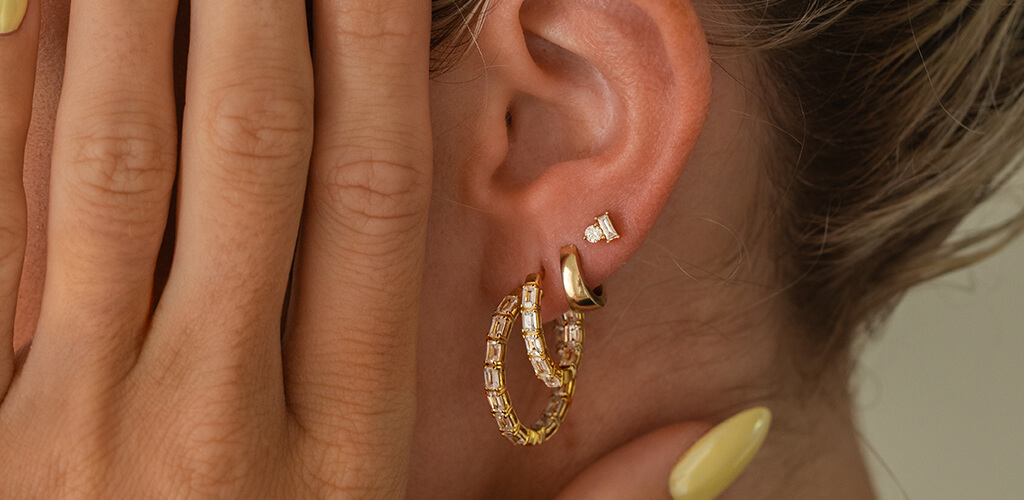
Who says those with sensitive skin can’t wear gorgeous jewelry? Let’s talk about hypoallergenic jewelry pieces that are perfect for you- and your skin!
Shopping for an engagement ring or new piece of jewelry is an exciting process, but things can quickly get complicated for those with sensitive skin. But don’t think you can’t wear beautiful jewelry because you have sensitive skin!
Fortunately, hypoallergenic jewelry pieces are available for those looking to find eye-catching accessories without irritating their skin. In this blog, we’ll provide helpful tips for finding hypoallergenic jewelry so you can wear the pieces you’ve always dreamt of.
So what exactly does ‘hypoallergenic’ even mean? Hypoallergenic jewelry is jewelry specifically designed to be less irritating to those with sensitive skin. Such pieces are made from materials known to be softer on the skin. Materials such as titanium, surgical-grade stainless steel, and niobium are all great options.
Hypoallergenic jewelry is often used for body piercings since piercings are highly likely to produce adverse reactions. But gentler metals are also favored by those with nickel allergies, as hypoallergenic jewelry does not contain nickel. In recent years, hypoallergenic jewelry has grown in popularity, as more people are searching for jewelry that looks and feels good on the skin.
The most common hypoallergenic metals are the following:
By choosing hypoallergenic jewelry, you can be sure that your jewelry will be gentle on your skin and safe to wear.

If you have sensitive skin or allergies, you may want to consider investing in hypoallergenic jewelry. Here are some signs that hypoallergenic jewelry is a must for you:
White gold is a popular choice for jewelry and other accessories, but it is not always great for those with sensitive skin. White gold is an alloy of gold and other metals, usually palladium or nickel.
Nickel is the more common of the two and is the one that often causes allergic reactions in people with sensitive skin. The amount of nickel present in white gold varies from piece to piece, so it is important to check the purity of the metal before buying.
If your skin is especially sensitive, you may want to avoid white gold altogether and opt for platinum or yellow gold instead. Platinum and yellow gold are both hypoallergenic metals and are less likely to cause any irritation- while still looking gorgeous!
Wearing hypoallergenic jewelry reduces the risk of rashes, itching, and other allergic reactions, allowing you to enjoy your favorite accessories comfortably and worry-free.
If you notice redness, dryness, or swelling after wearing jewelry, it’s a sign your skin may be sensitive to certain metals. Consider switching to hypoallergenic options to protect your skin.

Finding the right jewelry for your sensitive skin doesn’t mean compromising on style, even for special occasions. Whether it’s everyday wear, formal events, or pieces for children, there are hypoallergenic options for every moment in life. Here’s how to choose jewelry that suits your skin and the occasion perfectly:
For daily use, prioritize comfort and durability. Metals like surgical-grade stainless steel, titanium, and sterling silver are ideal for their lightweight, hypoallergenic properties and resistance to tarnishing. Silicone bracelets or rings are also excellent options for active individuals or those seeking minimalist designs. These materials blend seamlessly into your routine, whether you’re at work, running errands, or spending time at home.
When dressing up for weddings, galas, or formal events, hypoallergenic jewelry doesn’t mean sacrificing glamour. Choose pieces made from platinum or high-karat gold (18K or above) to achieve a luxurious look while ensuring skin safety. Platinum is particularly suited for statement pieces like necklaces, bracelets, or earrings due to its timeless shine and hypoallergenic nature. Alternatively, opt for sparkling cubic zirconia or conflict-free diamonds set in nickel-free settings to create an elegant, skin-friendly ensemble.
For casual outings, choose hypoallergenic jewelry that balances style with durability. Stainless steel or ceramic pieces are excellent for travel or outdoor activities, as they are resistant to scratches, moisture, and tarnish. Adjustable leather or silicone bracelets paired with nickel-free clasps can also add a fashionable touch to your relaxed, everyday look.
Children with sensitive skin need jewelry that’s not only hypoallergenic but also safe and practical. Choose materials like surgical-grade stainless steel, silicone, or 14K gold for children’s earrings, bracelets, or necklaces. Avoid pieces with sharp edges or small parts that could pose choking hazards. Brands offering hypoallergenic kids’ jewelry often include fun, colorful designs that your little ones will love while keeping their delicate skin protected.

Proper care ensures your hypoallergenic jewelry stays beautiful and lasts a long time. Here are some essential tips to keep your jewelry in top condition:
Clean Regularly but Gently
Wash your jewelry with mild soap and warm water to remove dirt, oils, and buildup that can accumulate over time. Use a soft cloth or a gentle toothbrush for intricate designs, avoiding abrasive materials that might scratch or damage the surface.
Avoid Harsh Chemicals
Remove your jewelry before using cleaning products, swimming in chlorinated pools, or applying lotions, perfumes, and hairsprays. Chemicals can tarnish metals or weaken coatings, reducing the effectiveness of your hypoallergenic jewelry.
Dry Thoroughly Before Storing
After cleaning, pat your jewelry dry with a lint-free cloth to prevent moisture from causing tarnish or corrosion. Allow it to air dry completely before putting it away.
Store Properly to Avoid Scratches
Keep your jewelry in a dedicated, soft-lined box or separate compartments to prevent pieces from scratching each other. Use anti-tarnish strips in your storage area to maintain metal shine.
Polish as Needed
Use a polishing cloth specifically designed for jewelry to restore the shine of metals like sterling silver or gold. Avoid polishing plated jewelry too frequently, as it may wear down the coating over time.
Know When to Remove Your Jewelry
Protect your jewelry by removing it during activities like exercising, gardening, or heavy lifting. This prevents unnecessary wear, scratches, and exposure to sweat or dirt.
Check for Damage Periodically
Inspect your jewelry for loose settings, worn clasps, or tarnished areas. Address these issues promptly to prevent further damage or loss of stones.
Use Professional Cleaning for Valuable Pieces
Consider professional cleaning once or twice a year for high-value items like platinum or diamond-encrusted jewelry. Professionals use techniques and tools that preserve the integrity of hypoallergenic materials.
Dealing with sensitive skin can often feel like an uphill battle. It can be nerve-wracking and time consuming, being overly concerned with what materials are in your clothes and what products you put on your skin. But jewelry shouldn’t cause the same concern! There are so many ways to keep your skin safe without compromising on looks. Hypoallergenic jewelry is both accessible and often affordable.
With this quick guide and many options on JamesAllen.com, you’ll be set in no time! If you’re still unsure which metals are right for you, we have experts available to help you along the way!
Any jewelry not made of low-quality or alloy metals will be kind to your skin! So that means wearing either stainless steel or solid gold. Most other hypoallergenic metals like platinum, sterling, and gold are less likely to cause an eczema flare up.
There are so many jewelry options for those who have allergies. Look for hypoallergenic jewelry such as nickel-free metals, sterling silver, platinum, and gold. Try to avoid buying jewelry plating with another metal or mixed metals such as white gold. With so many options, it is entirely possible to wear beautiful jewelry while staying comfortable!
Nickel-free means the metal contains no nickel or trace amounts below the threshold for causing allergic reactions.
Not always. While premium metals like platinum may cost more, affordable options like stainless steel or silicone are budget-friendly and hypoallergenic.